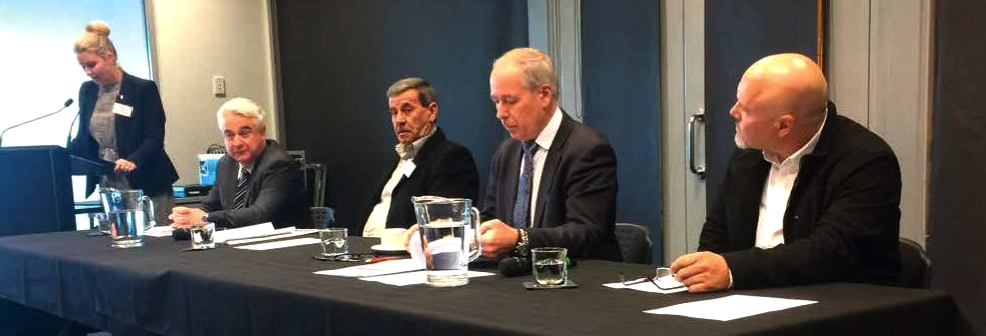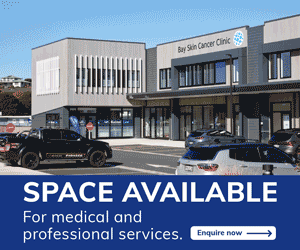The most notable feature of local body elections in the Bay tends to be that seldom more than 30 percent of the roll bothers to vote. But this year could be different.
There are plenty of candidates. Just at the mayoral level, in Tauranga, Mayor Greg Brownless is standing again, as is deputy mayor Kelvin Clout, former councillor Murray Guy, pastor Les Wallen, and Danny Cancian, the developer whose problematic Bella Vista homes development has been a key issue for the Tauranga City Council.
Meanwhile, small business expert and advocate Tenby Powell has been running a very high profile campaign. And as we went to print, there were rumours of another well-known business candidate likely to step into the ring at the last minute.
Garry Webber is standing again in Western Bay, while in Rotorua, Steve Chadwick seems to be under little threat.
But in Tauranga, fragmented and stalled infrastructure, housing development scandals, transport problems, and a moribund CBD have all contributed to what seems to be a greater than usual interest in what candidates are promising to deliver. As we batten down for what could be a difficult 12 months in the global economy, the business community will be expecting action.
And that has always been difficult to achieve in a city – and a region – where keeping down the rates has all too often stood in the way of decisive action.
Priority One chief executive Nigel Tutt told Bay of Plenty Business News there was a need for strong leadership.
“Conservative decision-making in an environment of high population and economic growth simply hasn’t worked,” he said.
“While doing not much might seem like the safest option, we’ve proven it to be risky in the longer term. A view that spans past next year’s rates increase will be important for the next mayor.”
Time for urgent action
Tauranga needed a clear plan and demonstrated action from the mayor and council to address Tauranga’s infrastructure problems, he said.
“This needs to be dealt with under urgency, and we would expect that to cover intensification, key congestion areas, non-traditional funding sources, and investment in multi-modal transport options.
“Continued support for the Urban Form and Transport Initiative will be a good start, and we are also looking for significant action to implement projects during this term. A key part of this will be ensuring that there are more productive relationships with other local authorities and the
government.”
Matt Cowley, the new chief executive of the Tauranga Chamber of Commerce, who has previously served a term as a Tauranga councillor, said the business community wanted to see focus and progress.
“There’s been a lot on the agenda over the last few years, but very little of that has eventuated,” he said.
“[The council] is a billion dollar entity and people want resources put to the most strategic issues of the city.”
Cowley said the chamber had been working with the Sustainable Business Network, and he said the two organisations were in agreement that transportation infrastructure development was key.
“That is one issue all parts of the business community are united on,” said Cowley.
Though Cowley praised the current council for opening up on key problem issues, he suggested there was a need to reinstill confidence and trust.
“There are some significant cultural issues within the organisations that need to be fleshed out,” he said. “These are around getting a council that can work professionally with [new TCC chief executive Marty Grenfell]to reinstate a positive, constructive focused culture back into the organisation.”
More collaboration needed
Garry Webber has become something of a fixture as mayor in the Western Bay, As we went to print, only councillor Margaret Murray-Benge was standing against him.
Webber said that over the next three years it was imperative that the sub region focused on transport, enabling affordable house, and dealing with climate change.
“There has been much wringing of hands and writing of reports about transport, but now it’s time to make the hard decisions and communicate with the residents about how we – Tauranga City, Western Bay and the regional councils – plan to prioritise, fund and implement the necessary solutions,” he said.
Webber added that on Affordable Housing, the sub region had been talking about ideas and proposals for many years and now was the time to put in place solutions.“Other districts have faced the intensification issues constructively, it just takes political will.”
Finally, Webber said incoming councils had to ensure that all of their infrastructure was future proofed to meet the challenges that will result from climate change.
Future thinking
Max Mason, a former chamber chief executive and mayoral candidate, who won a TCC council seat last elections, is standing down at the end of his term.
Although family reasons played a part in his decision, he made it clear to Bay of Plenty Business News that he has found the role frustrating and would like to see a more efficient system put in place.
“In a perfect world we’d have a mixed model, with say seven elected councillors to represent the community, plus four skills-based appointees to improve their decision-making capability,” he said.
“However, it’s not a perfect world. We already have plenty of community representatives, but we need four new organisational governance specialists who would make a big difference to better council decision-making.”
Mason said the community needed to encourage candidates who were smart and understood how decision-making occurs in large complex organisations. They could have experience of commercial boards, or large, complex not-for-profits.
“They would add real value and enjoy the satisfaction of putting something back,” he said.
“They would only need to commit for one term, and that’s probably an advantage because they won’t need to play politics with an eye on the next election.
Mason said that when choosing between existing councillors who were running again, voters should research what they had achieved outside council.
“The best predictor of future success is past success, so don’t be swayed by flashy slogans or cute marketing. If they have a history of good decision-making, and have been successful in non-political life, those skills are likely to be transferred into council.”


















